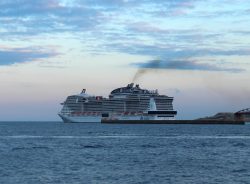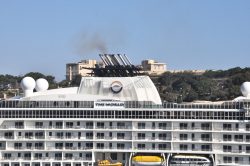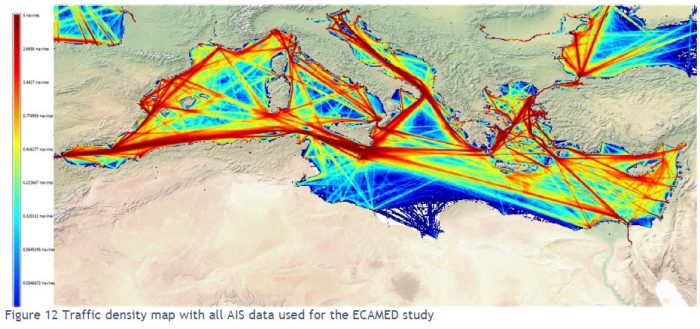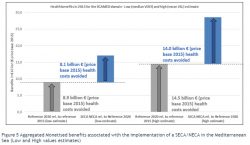Air pollution from ship traffic in the Mediterranean Sea can be significantly reduced due to the introduction of an Emission Control Area (ECA), a French study has found.
The impact assessment, which started in 2017, investigated potential air quality improvements in the region following a switch to better grade marine fuels as well as the related socio-economic benefits of reduced health costs and environmental damage obtainable by the designation of an ECA in the Mediterranean Sea. The report highlights that particulate matter (PM) can be reduced by up to 20% and nitrogen dioxide (NO2) levels even by up to 76%, leading to up to €14 billion in reduced health costs and potentially saving more than 6,000 lives every year in the region.
Shipping air pollution can represent up to 40% of all Mediterranean costal city air pollution. It represents a significant threat for human health, environment and climate. The main reason for this pollution is the use of heavy fuel oil, highly charged in sulphur that emits black carbon, heavy metals, fine particulates (primary and secondary), and sulphur dioxide. As pollutants are carried over long distances, it is not only the inhabitants of littoral zones but also the populations in the inland regions who are subject to respiratory issues as well as inflammations and cardiovascular diseases.
The key finding is that the region would benefit most from a combined Sulphur Emission Control Area (SECA) and Nitrogen Emission Control Area (NECA). Sulphur dioxide (SO2) would be reduced by 77% and in port areas even by 100%. NO2 would decline by up to 76% in coastal areas and the east of the Mediterranean Sea. The annual mean of particulate matter (PM2.5) will go down by 15 to 20%. Shipping emissions cause 50,000 premature deaths per year in Europe and cost €60 billion just in health costs per year in the European Union (EU). In the Mediterranean region only, about 6,000 premature deaths could be avoided due to the reduction of the particle pollution.
Governments in the region now called upon to take action after French study shows a Mediterranean ECA would bring up to €14 billion in annual savings of health costs
Charlotte Lepitre, Health Policy Officer at France Nature Environnement (FNE), said: “The study shows the need for a Mediterranean Emission Control Area. The French Environment Ministry must now take its role as a leader and search for support in as many Mediterranean countries as possible.”
Janina Laurent, Policy Officer at BirdLife Malta said: “The study results clearly indicate that an ECA, designated under International Maritime Organisation (IMO) standards, would be highly beneficial for the Mediterranean region and its citizens. The declaration of the Mediterranean Sea as an ECA would bring 8-14 billion euro in savings of health costs per year, however estimated costs of the designation would come to about €1.67 billion. Whereas most European countries – including Malta – have a public health sector that caters for diseases caused by air pollution, the €14 billion are created public costs at the expense of taxpayers. On the other hand, according to the study, the estimated costs of designating the Mediterranean Sea as an ECA are mainly generated by increased fuel prices of cleaner fuel, costs which would need to be covered by the initially responsible parties of air pollution at sea.”
Beate Klünder, Transport Policy Officer at Nature and Biodiversity Conservation Union (NABU), stated: “We see that a combined sulphur and nitrogen Emission Control Area will have the greatest effect for the people living in the coastal areas. If governments cooperate well, such a regulation could come into effect as early as 2022. Now that there is clear evidence for significant socio-economic benefits there is no excuse to further postpone an implementation. Any delay lets people suffer longer than necessary and that is not acceptable at all.”
Both FNE and NABU (BirdLife Germany), together with BirdLife Malta and several other international NGOs, are partners in the ongoing Together against Air Pollution from Ships project which is delivering an awareness campaign on air pollution generated by cruise ships in the Mediterranean with the ultimate goal of establishing an ECA in the Mediterranean Sea. All partners in the project have welcomed the conclusions of the French study which has just been published.
Read the Maltese version of the press release here. Click on the links below for further reading:
- The study which has just been published in France
- Background paper on the Mediterranean ECA
- BirdLife Malta’s Together against Air Pollution from Ships project
- What is an Emission Control Area (ECA)





